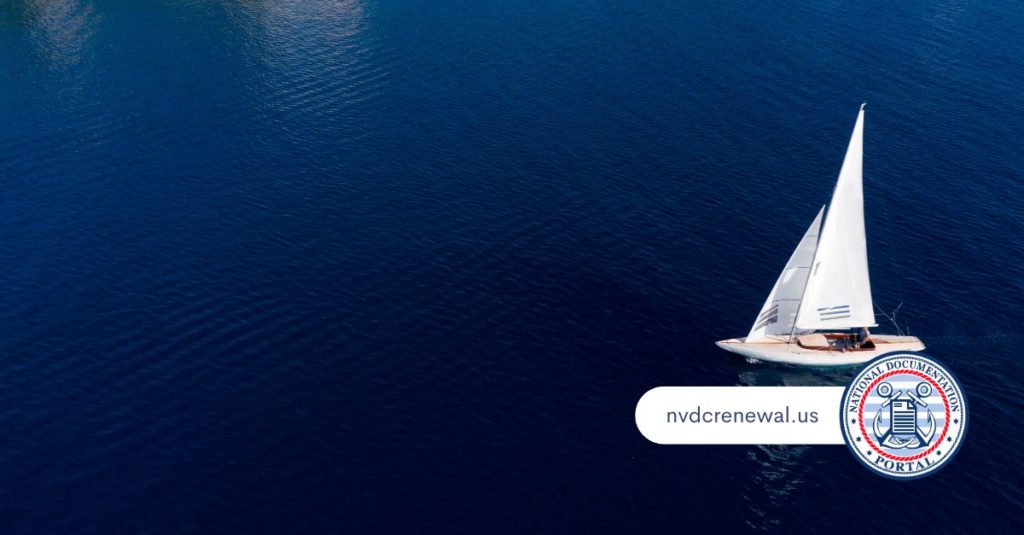You must renew it before its expiration date. You can complete your USCG documentation renewal through our simplified online portal, ensuring your paperwork is submitted correctly and on time.

To maintain a valid Certificate of Documentation for your vessel, you must renew by that deadline.
Failing to do so can lead to lapses in your vessel’s legal status, potential fines, and operational interruptions. The renewal process is a critical part of responsible vessel ownership, and understanding the timeline is key..
Staying ahead of your expiration date protects your vessel’s documented status and allows for uninterrupted use, whether for recreation or commercial activities.
USCG Documentation Renewal
Your Certificate of Documentation (COD) is the official federal registration of your vessel with the United States Coast Guard. This document is essential for various reasons, serving as proof of nationality for international voyages and being a prerequisite for vessels engaged in specific commercial trades. It also provides a clear and recognized chain of title for the vessel, which is crucial for financing and sales.
Without a valid COD, your vessel may not be legally permitted to operate in certain capacities.
Is Vessel Documentation Important?
Vessel documentation offers several advantages over state-level titling. For owners of larger recreational vessels (five net tons or more), it provides an internationally recognized certificate. This simplifies entry and clearance in foreign ports. For commercial vessels, documentation with the appropriate endorsement is often a legal requirement to engage in trades like fishing or coastwise transport.
Furthermore, a documented vessel has its ownership history recorded at a national level, offering a more secure and verifiable title. This can be a significant benefit when securing a preferred ship mortgage, as lenders often require federal documentation. Keeping this credential current is not just a regulatory task; it’s a fundamental part of managing your maritime asset.
The Ideal Timeline for USCG Documentation Renewal
While the simple answer is to renew before expiration, there is an optimal window for submission. We recommend initiating your renewal within the 30 days leading up to your expiration date. This timing ensures you receive the maximum validity period on your new certificate without creating a gap in your documentation status.
The Coast Guard issues new certificates that are valid from the date of issuance, so renewing too early can slightly shorten the overall documentation term. For instance, if your certificate expires on December 31st and you renew on November 1st, your new certificate’s validity will begin in November, effectively overlapping with your old one.
Renewing within that 30-day window minimizes this overlap while preventing any risk of expiration.
Multi-Year Renewal Options
Managing annual renewals can become a repetitive chore, especially for owners with multiple vessels or busy schedules. To streamline this responsibility, our platform offers the convenience of renewing your vessel documentation for multiple years at once, for particular vessels.
Certain vessel owners can select a renewal term of one, two, three, four, or even five years. This service allows you to secure your vessel’s documented status for an extended period, reducing annual administrative burdens and protecting you from potential fee increases in the future.
Opting for a multi-year renewal is a proactive step that provides long-term peace of mind, ensuring your vessel remains compliant without yearly oversight.
What Happens if Your Documentation Expires?
Letting your USCG Certificate of Documentation expire can create significant complications. Once the expiration date passes, your vessel is no longer considered documented by the federal government. This can have immediate consequences depending on how you use your vessel.
For commercial operators, it means a halt to all activities that legally require documentation. For recreational boaters traveling internationally, it could lead to issues with port authorities in foreign countries.
The 30-Day Grace Period and Reinstatement
The regulations provide a brief window after expiration. If your documentation has been expired for 30 days or less, you may still be able to proceed with a standard renewal. However, once that 30-day period has passed, the status of your documentation changes. It is no longer eligible for renewal.
Instead, you must go through the process of vessel documentation reinstatement. Reinstatement is a different application process designed to bring lapsed documentation back into active status. Our service provides a specific portal for this process, but it’s a situation best avoided.
Proactively managing your renewal timeline is far simpler and less stressful than navigating the requirements for reinstating an expired certificate. Keeping track of your expiration date is a crucial responsibility for any documented vessel owner.
The Legal Framework for Documentation
The requirements for vessel documentation and renewal are outlined in the Code of Federal Regulations. Specifically, Title 46, Part 67 governs the documentation of vessels. These regulations detail everything from eligibility and ownership requirements to the marking of the vessel with its official number and hailing port.
For example, Subpart L covers the issuance, renewal, and replacement of Certificates of Documentation.
These are not merely administrative guidelines but legal mandates that ensure the integrity of the national vessel registry. Our role is to provide a platform that helps you meet these legal requirements efficiently.
Using a Documentation Service for Compliance
Navigating federal regulations and correctly completing government forms can be a complex and time-consuming process. A single error or omission on an application can lead to delays or outright rejection, jeopardizing your vessel’s legal status. This is where our service adds significant value.
We have designed a user-friendly online platform that transforms the official forms into a simple, step-by-step process. Our system guides you through each section, ensuring that all required information is provided in the correct format.
Before submitting your application to the National Vessel Documentation Center, we review it for common errors, increasing the likelihood of a successful and timely processing. We act as your third-party processor, simplifying the interface between you and the government agency.
Preparing for Your Renewal
To ensure a smooth renewal process, it’s helpful to have your information ready. You will need your vessel’s official number (O.N.), which is the unique identifier assigned to your boat by the Coast Guard.
This number is typically marked on the interior structure of the hull. You should also confirm the vessel’s hailing port and the managing owner’s address on file are both current. If there have been any changes, such as a new mailing address, this is the perfect time to update that information.
Verifying Your Vessel’s Status
Before initiating a renewal, some owners find it helpful to confirm their vessel’s current documentation details. You can do this through a vessel documentation search on the public Coast Guard database. This allows you to verify the expiration date, ownership details, and other recorded information about your vessel.
Ensuring this data is accurate before you begin the renewal application can help prevent potential processing issues. If you discover discrepancies in the official record, they may need to be addressed through separate applications, such as an exchange of the certificate to reflect a change of address.
A Portal for USCG Documentation Renewal and More
Our platform provides distinct forms for these different needs, helping you choose the correct application for your situation. By using our simplified tools, you can confidently manage every aspect of your USCG documentation renewal.

